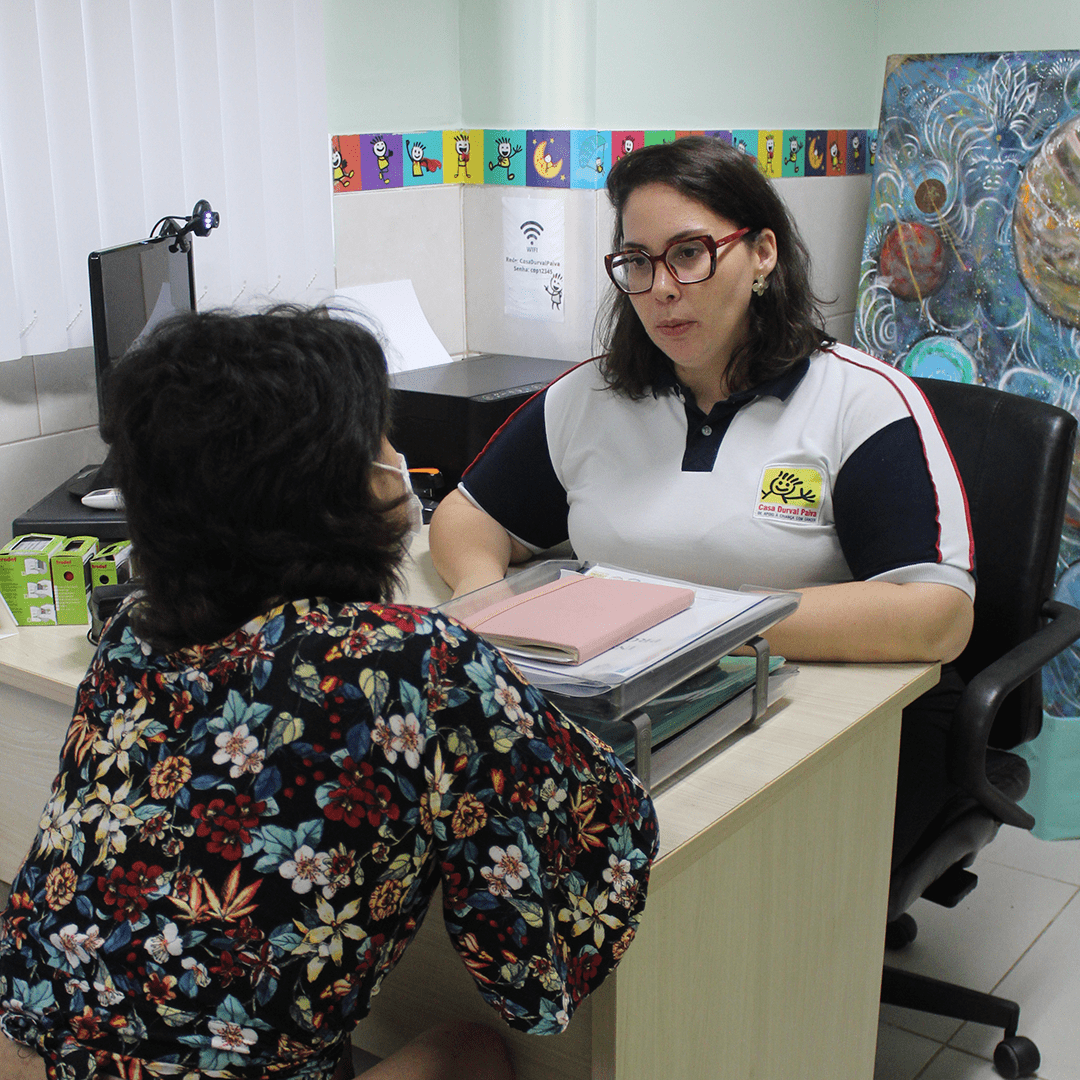
O Serviço Social atua na Casa de Apoio à Criança com Câncer Durval Paiva, desde 1997, e funciona como porta de entrada no acolhimento e cadastro dos pacientes onco-hematológicos. Possui um caráter inclusivo, interventivo e educativo, tendo como foco o processo curativo, a partir do acompanhamento sistemático, principalmente, no que diz respeito às questões socioeconômicas.
As suas ações estão ligadas diretamente à missão institucional de “Acolher crianças e adolescentes com câncer e doença hematológica crônica e seus familiares, antes, durante e após o tratamento, buscando a cura, contribuindo para o resgate da cidadania, dignidade e qualidade de vida” e a visão de “Ser referência na excelência do acolhimento e nas práticas de promoção do diagnóstico precoce”.
O setor tem como objetivo proporcionar acolhimento, atendimento e acompanhamento social aos pacientes e aos seus respectivos familiares. No ano de 2023, realizou 3.967 atendimentos a 322 crianças e adolescentes, com suspeita ou diagnóstico de câncer e 162 com doença hematológica crônica, além disso, foram atendidos 283 acompanhantes desses respectivos pacientes.

O Serviço Social atua na Casa de Apoio à Criança com Câncer Durval Paiva, desde 1997, e funciona como porta de entrada no acolhimento e cadastro dos pacientes onco-hematológicos. Possui um caráter inclusivo, interventivo e educativo, tendo como foco o processo curativo, a partir do acompanhamento sistemático, principalmente, no que diz respeito às questões socioeconômicas.
O Serviço Social atua na Casa de Apoio à Criança com Câncer Durval Paiva, desde 1997, e funciona como porta de entrada no acolhimento e cadastro dos pacientes onco-hematológicos. Possui um caráter inclusivo, interventivo e educativo, tendo como foco o processo curativo, a partir do acompanhamento sistemático, principalmente, no que diz respeito às questões socioeconômicas.
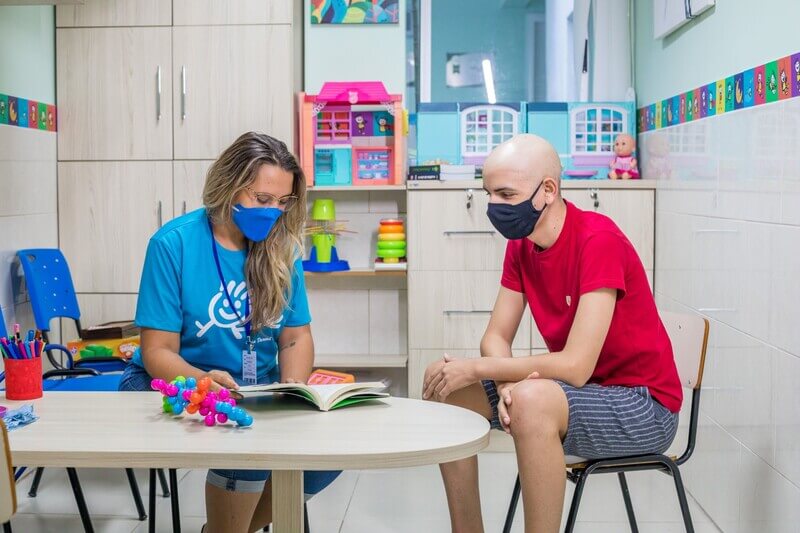
A Organização Mundial de Saúde (OMS) define saúde como “um estado de completo bem estar físico, mental e social e, não somente, ausência de afecções e enfermidades”. Sendo assim, o setor de psicologia da Casa Durval Paiva visa acolher e acompanhar pacientes e familiares, em suas demandas emocionais e psicológicas, que sejam determinantes para seu bem-estar diário no tratamento oncológico ou hematológico. Para além dele, avaliando e aplicando intervenções, que melhor o auxiliem, promovendo, assim, uma melhoria na qualidade de vida de maneira geral.
Tendo em consideração que o fazer do profissional do setor em questão utiliza diferentes atividades, quais sejam: busca ativa, acolhimento e acompanhamento psicológico individual, tanto na CDP, como na unidade da LIGA, a Policlínica, ou algum outro hospital, caso necessário. Além disso, grupos de crianças, adolescentes e acompanhantes com temas voltados para a saúde mental, realizando assim a psicoeducação, também, e articulação e integração com toda a equipe multiprofissional, que vai utilizar os diversos espaços físicos da instituição para desenvolvimento do trabalho.
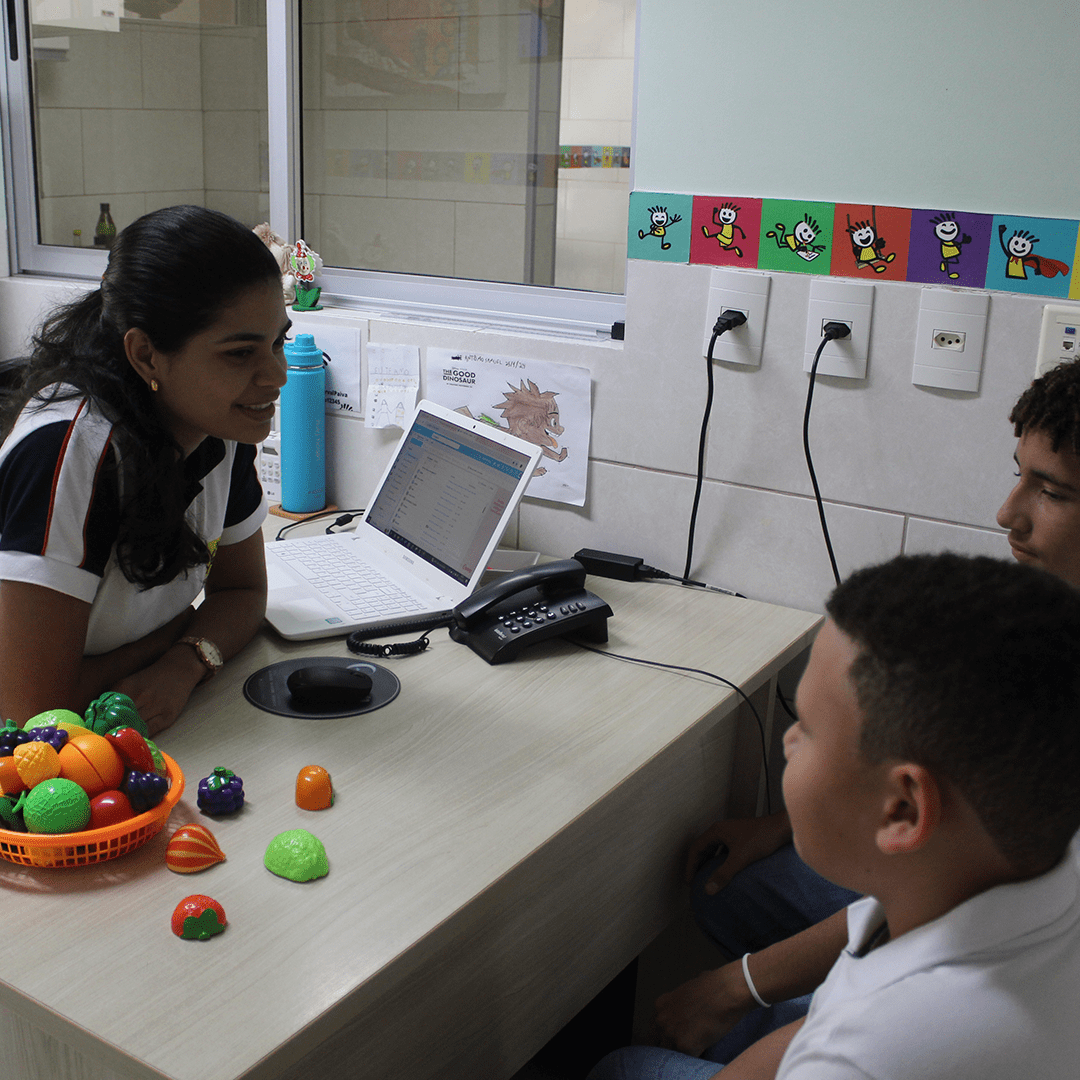
O setor de nutrição e dietética da Casa Durval Paiva é composto por duas áreas: cozinha, para a produção de alimentos, que abrange uma Unidade de Alimentação e Nutrição – UAN, com a finalidade de fornecer refeições diárias, bem como assegurar a qualidade higiênico sanitária das refeições servidas aos pacientes, acompanhantes e colaboradores. Outra área é a clínica, que oferece assistência nutricional, individual e coletiva, aos pacientes e familiares beneficiados pela organização, através de atendimento clínico e de doação mensal de cesta básica, leite e suplemento em pó.
Em conjunto com a classe domiciliar da CDP, o setor de nutrição também desenvolve o Projeto “Educando para Nutrir”, que tem como principal objetivo motivar as crianças e adolescentes portadores de câncer e doenças hematológicas a adquirirem um hábito alimentar saudável, promovendo educação alimentar aos usuários e explanando sobre a importância e valor nutricional de uma alimentação balanceada como extensão do tratamento.
Os serviços ofertados pela parte clínica da nutrição, no ano de 2023, contaram com 256 atendidos e 2.445 atendimentos, que consistem em avaliações e entregas de planos alimentares individualizados para os pacientes, a fim de que haja uma melhor recuperação do tratamento oncológico e atenda suas necessidades especificas.
Fornecemos 43.210 refeições diárias, seguindo a lei da quantidade, qualidade, harmonia e adequação. Foram distribuídas um total de 3.126 cestas, com o objetivo de diminuir a insegurança alimentar e proporcionar uma alimentação adequada e saudável para as famílias beneficiadas pelo programa da CDP.
.
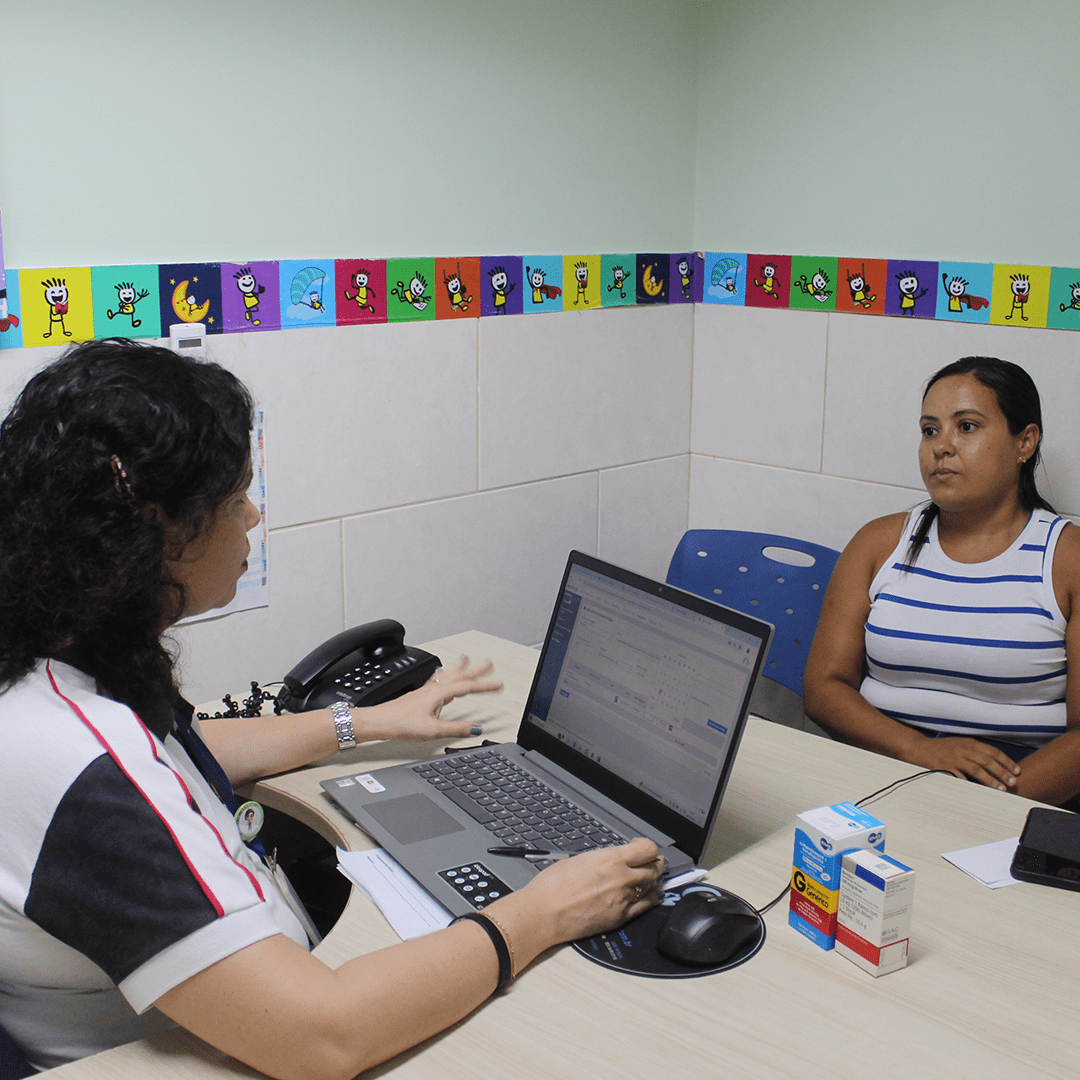
O dispensário de medicamentos permite ao farmacêutico estreitar relação de confiança com o paciente e o acompanhante, garantindo a dispensação dos medicamentos, de forma adequada, onde todas as orientações são fornecidas para que o uso da farmacoterapia, que é o uso de vários medicamentos, durante o tratamento, seja racional, garantido a segurança e bem-estar dos pacientes.
O farmacêutico presta a assistência e atenção farmacêutica, durante todo o tratamento oncohematológico, dando o suporte às famílias acolhidas pela instituição, tanto por meio presencial, como também por meio remoto, dando os apontamentos e orientações. Com isso, promove um impacto nas famílias, pois o setor articula com órgãos públicos a garantia do acesso aos medicamentos.
O farmacêutico fornece, ainda, as medicações adjuvantes ao tratamento. Elas promovem o bem-estar do paciente, reduzindo as reações adversas e proporcionando uma melhor qualidade de vida.
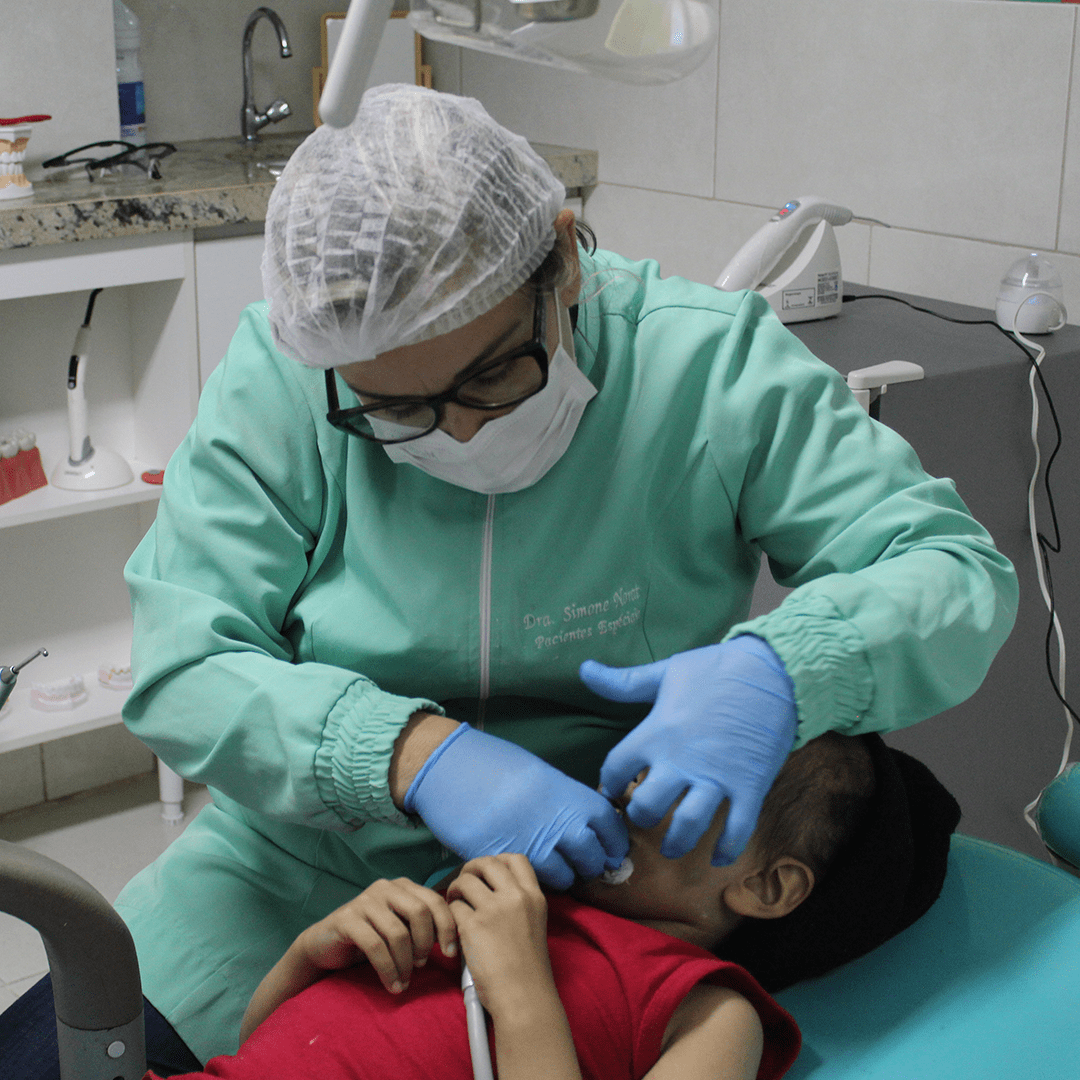
O serviço odontológico atua, desde 1998, para atender os pacientes oncohematológicos cadastrados e seus acompanhantes. Tem como objetivo diagnosticar, prevenir e tratar as doenças bucais, como também os efeitos colaterais na cavidade bucal decorrentes dos tratamentos quimio e radioterápicos. O serviço é disponibilizado diariamente nos hospitais parceiros e no consultório da instituição. O acompanhamento dos pacientes oncológicos se dá antes, quando possível, durante e após o tratamento.
O acompanhamento dos pacientes, realizado pelo cirurgião-dentista, tem como objetivo minimizar foco de infecções bucais e os efeitos colaterais decorrentes do tratamento que possam a vir comprometer o prognóstico do diagnóstico podendo acarretar a interrupção do tratamento causada por mucosites (ulcerações), dor, infecção viral ou fúngica, que se manifestem, durante o tratamento oncológico. Nos pacientes hematológicos crônicos, esse acompanhamento especializado é importante na manutenção da saúde bucal, como também para evitar riscos de hemorragias espontâneas, devido à falta de higiene oral, que acarreta inflamação e sangramento gengival, como também, desencadear crises falcêmicas (agravar os sintomas da anemia falciforme).
No ano de 2023, o serviço odontológico realizou 1.849 atendimentos, dos quais 149 pacientes oncológicos, 55 hematológicos, 57 acompanhantes e 1 paciente em investigação. Desses atendimentos, 1.051 foram realizados em ambiente hospitalar, onde as crianças são atendidas em leito, recebendo o tratamento necessário, desde laserterapia a exodontia (extração de dente), e 764, no consultório da instituição.
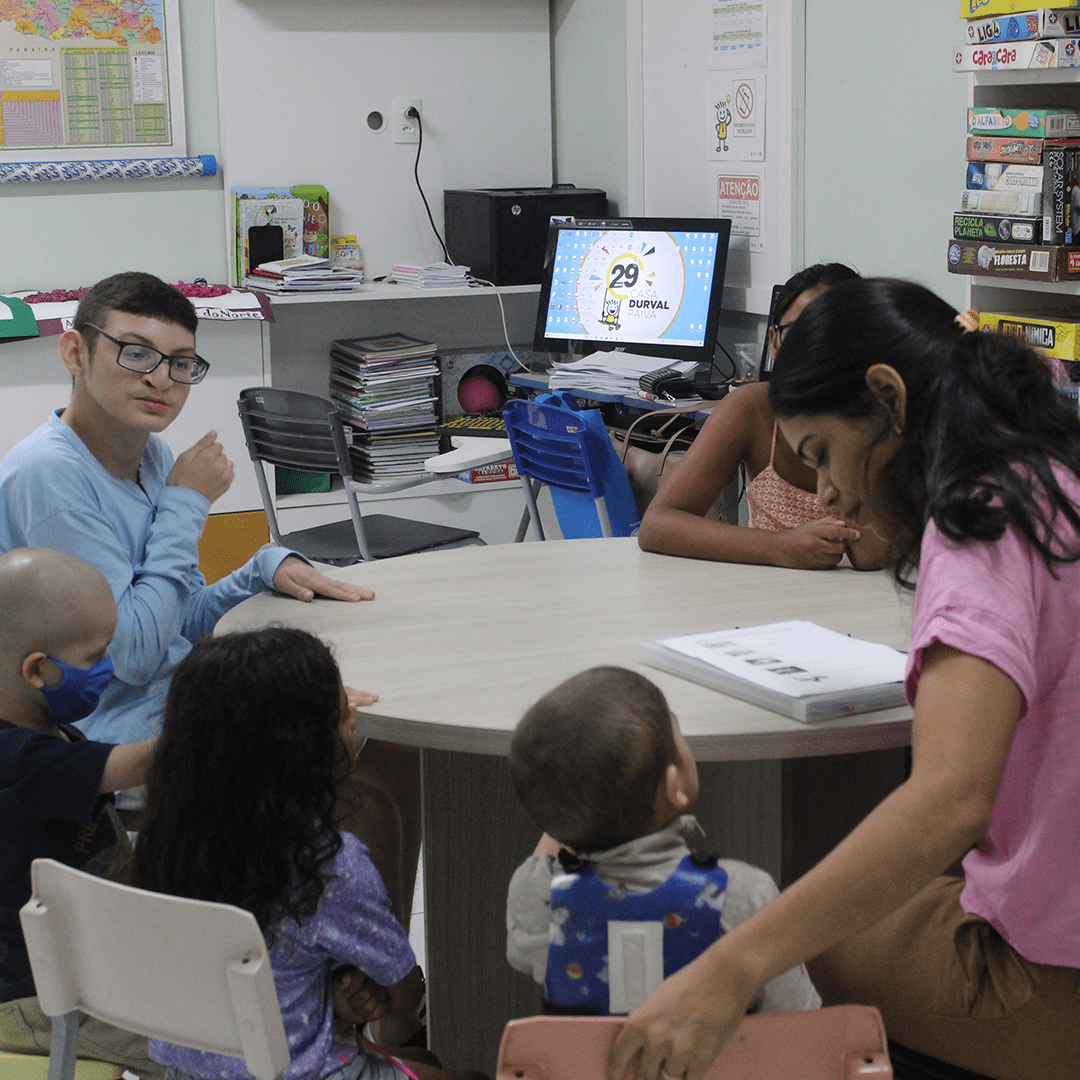
O setor de fisioterapia da Casa Durval Paiva atua com o objetivo de melhorar a qualidade de vida de pacientes diagnosticados com câncer e doenças hematológicas crônicas. Para isso, acolhe os pacientes e promove, através do tratamento de reabilitação, a melhora dos aspectos físicos (mobilidade, força muscular, coordenação motora, equilíbrio, etc); o controle de sintomas como dor e cansaço; ações de bem estar.
Também oferece aos pacientes, sem possibilidades terapêuticas de cura, e seus familiares, cuidados paliativos para que tenham alívio do sofrimento.
A atuação em conjunto com a equipe multidisciplinar contribui para a atenção integral ao paciente. Mais do que melhorar a força muscular ou mobilidade, o setor de fisioterapia promove a autonomia e independência funcional do paciente colaborando para a reinserção no seu contexto de vida.
No ano de 2023, o setor de fisioterapia atendeu 97 pacientes, totalizando 527 atendimentos.
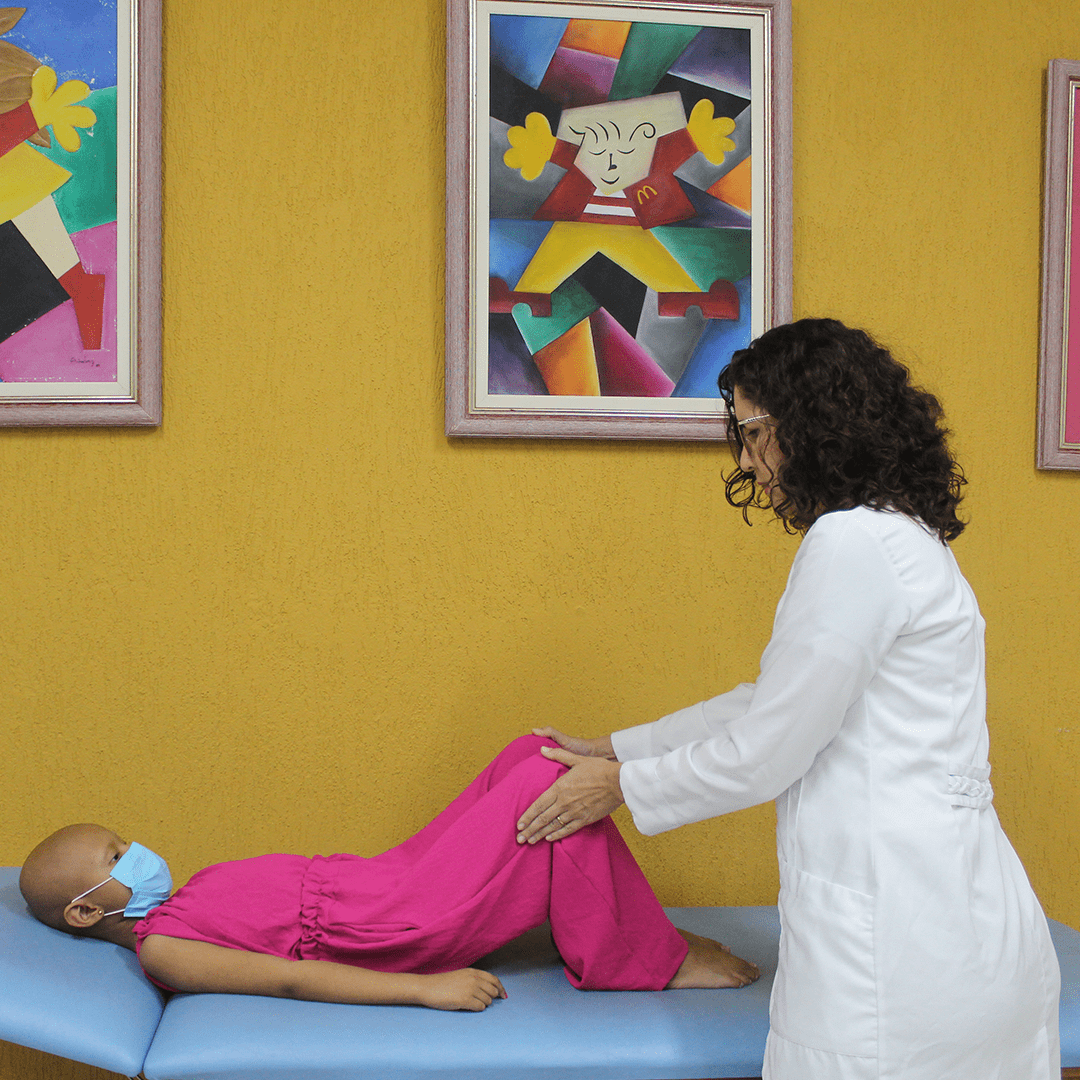
O setor de fisioterapia da Casa Durval Paiva atua com o objetivo de melhorar a qualidade de vida de pacientes diagnosticados com câncer e doenças hematológicas crônicas. Para isso, acolhe os pacientes e promove, através do tratamento de reabilitação, a melhora dos aspectos físicos (mobilidade, força muscular, coordenação motora, equilíbrio, etc); o controle de sintomas como dor e cansaço; ações de bem estar.
Também oferece aos pacientes, sem possibilidades terapêuticas de cura, e seus familiares, cuidados paliativos para que tenham alívio do sofrimento.
A atuação em conjunto com a equipe multidisciplinar contribui para a atenção integral ao paciente. Mais do que melhorar a força muscular ou mobilidade, o setor de fisioterapia promove a autonomia e independência funcional do paciente colaborando para a reinserção no seu contexto de vida.
No ano de 2023, o setor de fisioterapia atendeu 97 pacientes, totalizando 527 atendimentos.
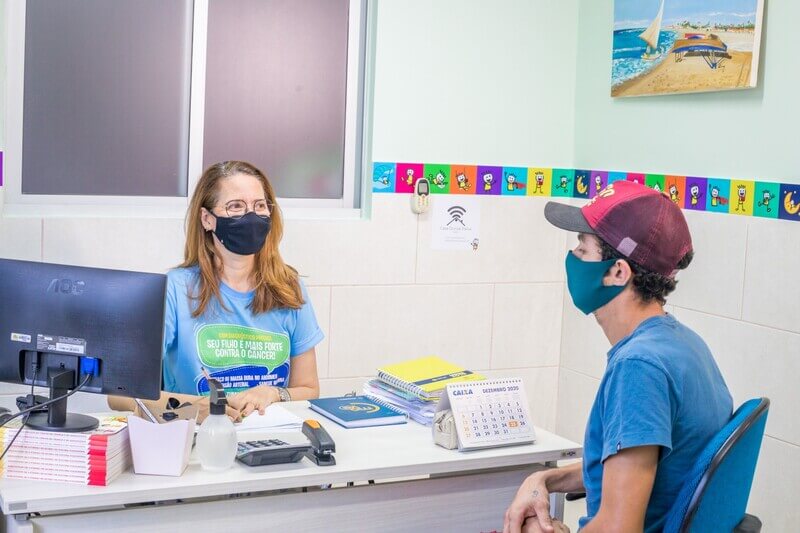
O Setor de Diagnóstico Precoce surgiu da necessidade de ampliar seus horizontes acerca dos sinais e sintomas do câncer infantojuvenil. A Casa Durval Paiva trabalha nessa vertente, desde 2002, e, em 2020, surgiu o setor, para melhor atender a essa população que necessita de tantos cuidados. Sendo o carro chefe da CDP, onde a busca pelo diagnóstico torna-se um fator determinante, fazendo com que a sua cura seja mais rápida, menos dolorosa, menos custosa, menos invasiva, projetando uma cura sem sequelas.
Com isso, o setor do Diagnóstico Precoce busca capacitar os profissionais da saúde, sensibilizar os profissionais da educação e a sociedade civil acerca dos sinais de alerta, para que eles possam ter um olhar diferenciado e incentivar a população que, na dúvida, procure o médico para maiores esclarecimentos.
No último ano, foram realizadas 37 capacitações, 14 sensibilizações, 993 profissionais da saúde capacitados, 506 sensibilizações realizadas, 11 municípios atendidos. A intenção é ampliar os números de capacitações e sensibilizações e atingir o RN com a multiplicação da importância do diagnóstico precoce e os sinais de alerta.
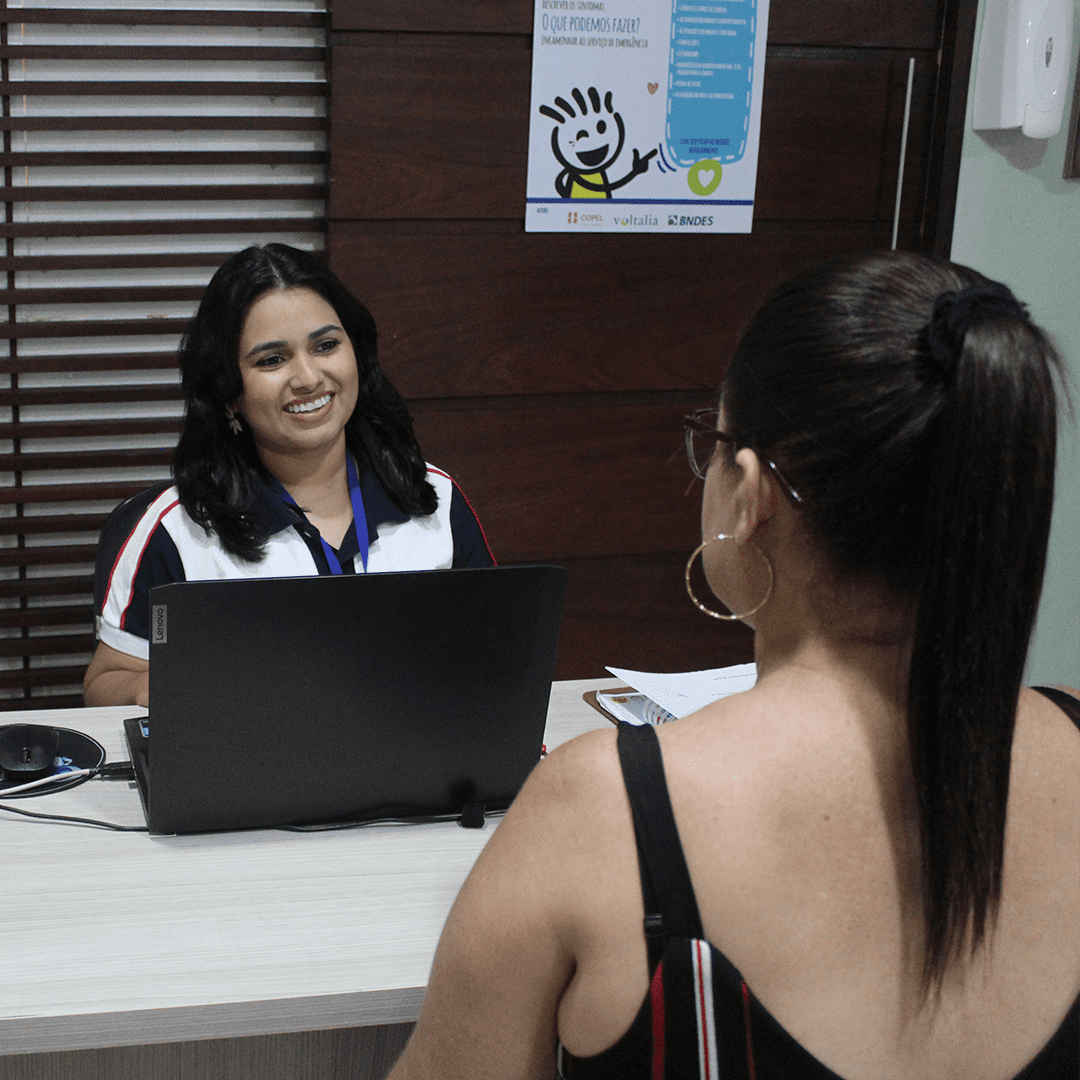
A Casa dos Ofícios desempenha um papel fundamental na promoção da dignidade, através de cursos e oficinas de capacitação profissional, com intuito de geração de renda às famílias assistidas pela CDP, que estão ou estiveram em processo de acompanhamento hospitalar.
Ao capacitar os jovens pacientes, mães acompanhantes e/ou integrantes do núcleo familiar, o setor não apenas fornece meios de subsistência, mas também resgata a autoestima e a autoconfiança. O setor conta com a estrutura de um ateliê de artes, um salão de beleza e uma cozinha pedagógica.
No último ano, foram 452 capacitações dos 64 cursos e/ou oficinas ofertados em 4 áreas de atuação, tais como: artes, gastronomia, informática, beleza e empreendedorismo. Em paralelo a abordagem GTR (geração de trabalho e renda) participou de exposições e venda em 12 estandes de feiras de artesanatos, onde parte do valor arrecadado é repassado para as mães/artesãs/profissionais envolvidas, resultados da economia criativa, produtos da manufatura produzidos nas oficinas de artes e dos serviços do salão de beleza da casa dos ofícios.
O impacto social se estende às vidas transformadas, histórias de superação e à construção de uma mentalidade empreendedora.